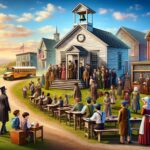Discover 10 Intriguing Facts about John Lewis. As a towering figure in American history, John Lewis is known for his unwavering commitment to civil rights and his relentless pursuit of justice. However, beyond his well-documented contributions as a prominent activist and politician, there exist lesser-known facets of his life that reveal the depth of his character and the impact he had on society. In this article, we uncover 10 captivating facts about John Lewis, offering a glimpse into the remarkable journey of an extraordinary individual.

Key Takeaways:
- John Lewis had aspirations of becoming a preacher from a young age and credited his early experiences in preaching to his upbringing and faith.
- After being sworn into Congress, Lewis worked for 15 years to establish the national African American museum in Washington, which showcases the rich history and contributions of African Americans.
- As a student, John Lewis actively participated in the civil rights movement, including sit-ins and playing a role in The Nashville Student Movement.
- Lewis served as the Chairman of the Student Nonviolent Coordinating Committee, advocating for nonviolent protest strategies.
- John Lewis was one of the prominent leaders known as the “Big Six” of the civil rights movement, alongside figures such as Martin Luther King Jr.
- He actively participated in the historic 1963 March on Washington and delivered a notable speech advocating for equal rights and nonviolent protest.
- Throughout his life, Lewis advocated for nonviolent protest and fought against racial segregation.
- He was awarded the Presidential Medal of Freedom in 2011 for his significant contributions to civil rights and society.
- John Lewis passed away on July 17, 2020, but his life and work continue to inspire generations to fight for justice, equality, and freedom.
10 Interesting Facts about John Lewis
John Lewis, an influential American civil rights leader and politician, made significant contributions to the advancement of racial equality in the United States. Here are 10 captivating facts about John Lewis that shed light on his remarkable journey:
1. Aspired to be a Preacher
From a young age, John Lewis aspired to be a preacher. At the age of 15, he delivered his first public sermon. His upbringing and deep-rooted faith played a crucial role in shaping his commitment to advocating for justice and equality.
2. Fought for the Establishment of the National African American Museum
As a congressman, John Lewis introduced a bill to create the National African American Museum in Washington. Despite initial setbacks, he persisted for 15 years until the museum was finally established, showcasing the rich history and contributions of African Americans.
3. Part of The Nashville Student Movement
During his time as a student, John Lewis actively participated in the civil rights movement. He took part in sit-ins at segregated lunch counters in Nashville, Tennessee, and played a significant role in The Nashville Student Movement.
4. Chairman of the Student Nonviolent Coordinating Committee (SNCC)
Lewis served as the Chairman of the Student Nonviolent Coordinating Committee (SNCC), a prominent civil rights organization. Through his courage and tenacity, he advocated for nonviolent protest strategies that shaped the course of the civil rights movement.
5. One of the “Big Six” Leaders of the Civil Rights Movement
John Lewis was one of the prominent leaders known as the “Big Six” of the civil rights movement. Alongside notable figures such as Martin Luther King Jr., Lewis played a significant role in advancing the cause of racial equality in America.
6. Participation in the 1963 March on Washington
Lewis actively participated in the historic 1963 March on Washington. During this momentous event, he delivered a powerful speech, advocating for equal rights for all Americans and emphasizing the importance of nonviolent protest.
7. Advocate for Nonviolent Protest and Fighter Against Racial Segregation
Throughout his life, John Lewis advocated for nonviolent forms of protest and fought against racial segregation. His unwavering commitment to equality and justice made him a prominent figure in the civil rights movement.
8. Presidential Medal of Freedom Recipient
In recognition of his significant contributions to civil rights and the betterment of society, Lewis was awarded the Presidential Medal of Freedom, the highest civilian award in the United States, in 2011. This honor further highlighted his immense impact.
9. Legacy and Passing
John Lewis’s legacy continues to inspire generations to fight for justice, equality, and freedom. Although he passed away on July 17, 2020, his life and work serve as a constant reminder of the importance of perseverance and the pursuit of a more just society.
10. His Enduring Impact
John Lewis’s enduring impact on American society cannot be overstated. His dedication to equality, nonviolent protest, and the fight against racial segregation left an indelible mark on the civil rights movement and continues to shape the pursuit of a more equitable future.
John Lewis’s life journey and his tireless efforts in the civil rights movement serve as a testament to the power of determination and the profound impact one individual can have in shaping the course of history. His story will forever inspire and encourage others to stand up for justice and equality.
These facts provide a glimpse into the remarkable life of John Lewis and his unwavering commitment to creating a more just and inclusive society. Through his leadership and activism, he played a pivotal role in advancing the civil rights movement. John Lewis’s legacy will continue to inspire and guide future generations in the ongoing fight for equality and justice for all.
If you’re curious about interesting facts about Lin-Manuel Miranda, click here to discover some fascinating tidbits about this talented artist.
For fun facts about Bruno Mars, click here and prepare to be entertained by surprising and delightful information about this incredible musician.
Lewis was a key figure in the 1965 Selma to Montgomery voting rights marches
The Selma to Montgomery Marches were a pivotal moment in the fight for voting rights and equality in America. Led by civil rights activist John Lewis, these marches played a crucial role in raising national awareness about the struggles faced by African-Americans. Here are ten intriguing facts about John Lewis and his involvement in the Selma to Montgomery voting rights marches:
- Early Activism: John Lewis was a young civil rights activist who passionately fought against racial segregation and discrimination in the Jim Crow South.
- Inspiring Leadership: As one of the “Big Six” leaders of the civil rights movement, John Lewis played a key role in organizing and leading the Selma to Montgomery Marches.
- Bloody Sunday: On March 7, 1965, John Lewis and other civil rights activists attempted to march across the Edmund Pettus Bridge in Selma, Alabama. They were met with brutal violence from state troopers in an event that became known as “Bloody Sunday.”
- Nonviolent Advocacy: John Lewis was a strong advocate for nonviolent protest, believing in the power of peaceful demonstrations to bring about social change.
- Historic Speech: During the 1963 March on Washington, John Lewis delivered a powerful speech emphasizing the need for equality and justice. His words resonated with millions and helped galvanize support for the civil rights movement.
- Impactful Legislation: The Selma to Montgomery Marches led to the eventual passage of the Voting Rights Act of 1965. This landmark legislation aimed to protect and enforce the voting rights of minority groups, marking a significant step towards equality.
- Enduring Legacy: Despite his passing in 2020, John Lewis’s legacy continues to inspire future generations. His dedication and unwavering commitment to civil rights paved the way for a more just and equitable society.
- Presidential Recognition: In 2011, John Lewis was awarded the Presidential Medal of Freedom, the highest civilian honor in the United States. This prestigious recognition reflects his immense contributions to the fight for civil rights.
- Life of Service: John Lewis’s activism extended beyond his involvement in the Selma to Montgomery Marches. Throughout his life, he fought for various causes, including the establishment of the National African American Museum in Washington, D.C.
- Ripple Effect: The Selma to Montgomery Marches and John Lewis’s leadership continue to shape American society. They serve as a reminder of the power of grassroots movements and the importance of individuals standing up for justice and equality.
Key Takeaways:
– John Lewis played a key role in the Selma to Montgomery voting rights marches, which were instrumental in raising awareness about the struggles faced by African-Americans.
– He was a strong advocate for nonviolent protest and believed in the power of peaceful demonstrations to effect change.
– The Selma to Montgomery Marches ultimately led to the passage of the Voting Rights Act of 1965, protecting and enforcing the voting rights of minority groups.
– John Lewis’s enduring legacy continues to inspire future generations in the pursuit of a more just and equitable society.
To learn more about the Selma to Montgomery Marches and John Lewis’s involvement, you can visit the following sources:
He served as a U.S. Representative for Georgia’s 5th congressional district for over three decades
Key Takeaways:
- John Lewis served as the U.S. Representative for Georgia’s 5th congressional district for more than 30 years.
- He was a prominent figure in American civil rights history and a respected leader.
- Lewis played a crucial role in the struggle for racial equality and justice.
- His dedication to public service and his constituents made him a beloved representative.
John Lewis’s impact on American society extends far beyond his role as a U.S. Representative for Georgia’s 5th congressional district. Serving in this position for over three decades, Lewis became a symbol of hope and progress for countless individuals. His unwavering commitment to civil rights and his dedicated service to his constituents cemented his legacy as a respected and influential leader.
Representing Georgia’s 5th congressional district, Lewis continually fought for equality, justice, and the rights of marginalized communities. His tenure in Congress not only showcased his proficiency as a lawmaker but also his deep understanding of the complexities facing his district and the nation as a whole.
As a U.S. Representative, Lewis championed various causes, notably in the areas of civil rights, voting rights, and social justice. His commitment to defending the rights of all Americans, regardless of their race or background, manifested in his tireless efforts to address systemic injustices and promote a more inclusive society.
Lewis’s tenure as a congressman granted him firsthand experience in navigating the intricate landscape of U.S. politics and legislative processes. His expertise and experience allowed him to advocate effectively for his constituents and the issues close to his heart. By serving in Congress for such a substantial period, Lewis was able to establish relationships with other lawmakers and influence policy decisions that positively impacted his district and the nation.
Throughout his career, Lewis inspired a new generation of leaders, activists, and individuals seeking to make a difference. His dedication to public service and his constituents set an example for aspiring leaders, emphasizing the importance of serving others and striving for positive change.
Despite his passing in 2020, John Lewis’s impact continues to resonate in the halls of Congress and the hearts of the people he served. His legacy as a trailblazer, peacemaker, and civil rights icon lives on, inspiring future generations to stand up for justice, equality, and the pursuit of a brighter future for all.
[Sources]
– Wikipedia – Georgia’s 5th Congressional District
– CNN – Civil rights legend Rep. John Lewis dead at 80
Lewis Received Numerous Awards and Honors Throughout His Lifetime
John Lewis, a prominent figure in the American Civil Rights Movement, dedicated his life to advocating for equality, justice, and voting rights. His remarkable contributions did not go unnoticed, as he received numerous awards and honors in recognition of his brave and influential activism. Let’s delve into 10 intriguing facts about John Lewis’s remarkable accomplishments.
1. Presidential Medal of Freedom (source)
John Lewis was awarded the Presidential Medal of Freedom, the highest civilian honor in the United States, in 2011. This prestigious award acknowledged his lifetime commitment to civil rights, nonviolent protest, and public service.
2. National Association for the Advancement of Colored People (NAACP) Spingarn Medal
Lewis received the NAACP Spingarn Medal, which recognizes outstanding achievements by African Americans, in 2002. This esteemed honor celebrated his contributions to the civil rights movement and his unwavering dedication to securing voting rights for all Americans.
3. John F. Kennedy Profile in Courage Award
In 2001, John Lewis was honored with the John F. Kennedy Profile in Courage Award. This recognition highlighted his courageous and principled leadership in the face of adversity, particularly during the civil rights movement.
4. Martin Luther King Jr. Nonviolent Peace Prize
Lewis was awarded the Martin Luther King Jr. Nonviolent Peace Prize in 1975. This esteemed prize acknowledged his commitment to nonviolent protest in the pursuit of justice and racial equality.
5. Lifetime Achievement Award from the National Urban League (source)
In 2016, John Lewis received the Lifetime Achievement Award from the National Urban League. This accolade recognized his lifelong dedication to civil rights activism and his efforts to empower African Americans.
6. John F. Kennedy Library Foundation’s Distinguished Service Award
Lewis was honored with the John F. Kennedy Library Foundation’s Distinguished Service Award in 1998. This award celebrated his outstanding contributions to public service and his relentless pursuit of justice.
7. National Medal of Freedom
In 2010, John Lewis was bestowed with the National Medal of Freedom, one of the highest civilian honors in the United States. This prestigious award acknowledged his lifelong commitment to civil rights and his extraordinary leadership in the pursuit of equality.
8. Four Freedom Award
Lewis received the Four Freedom Award in 2019. This honor, named after President Franklin D. Roosevelt’s four fundamental freedoms, recognized his tireless efforts to uphold these ideals: freedom of speech, freedom of worship, freedom from want, and freedom from fear.
9. Walter Payton Man of the Year Award
In 2015, Lewis was honored with the Walter Payton Man of the Year Award. This award recognized his exceptional humanitarian efforts and his commitment to making a positive impact on society.
10. Ellis Island Medal of Honor
John Lewis received the Ellis Island Medal of Honor in 2000. This esteemed award celebrated his significant contributions to society and his unwavering dedication to civil rights.
Key Takeaways:
- John Lewis received the Presidential Medal of Freedom, the highest civilian honor in the United States, in 2011.
- He was honored with the NAACP Spingarn Medal, which acknowledges outstanding achievements by African Americans, in 2002.
- Lewis received the John F. Kennedy Profile in Courage Award in 2001 for his courageous leadership during the civil rights movement.
- He was awarded the Martin Luther King Jr. Nonviolent Peace Prize in 1975 for his commitment to nonviolent protest.
- John Lewis received the Lifetime Achievement Award from the National Urban League in 2016.
- He was honored with the John F. Kennedy Library Foundation’s Distinguished Service Award in 1998.
- Lewis received the National Medal of Freedom, one of the highest civilian honors, in 2010.
- He was awarded the Four Freedom Award in 2019, recognizing his commitment to fundamental freedoms.
- John Lewis received the Walter Payton Man of the Year Award in 2015 for his humanitarian efforts.
- He was bestowed with the Ellis Island Medal of Honor in 2000, celebrating his contributions to society.
Sources:

FAQ
Q1: What were some of John Lewis’s significant contributions to the civil rights movement?
A1: John Lewis made significant contributions to the civil rights movement, including his involvement in the Nashville Student Movement, his leadership in the Student Nonviolent Coordinating Committee (SNCC), and his participation in the historic 1963 March on Washington.
Q2: How did John Lewis advocate for nonviolent protest and fight against racial segregation?
A2: Throughout his life, John Lewis advocated for nonviolent forms of protest and fought against racial segregation. His dedication to equality and justice made him a prominent figure in the civil rights movement.
Q3: What recognition did John Lewis receive for his contributions to civil rights?
A3: In 2011, John Lewis was awarded the Presidential Medal of Freedom, the highest civilian award in the United States, highlighting his significant contributions to civil rights and the betterment of society.
Q4: What is the significance of the Selma to Montgomery Marches in American history?
A4: The Selma to Montgomery Marches played a crucial role in raising national awareness about the voting rights struggles faced by African-Americans. These protests contributed to the eventual passage of the Voting Rights Act of 1965, which aimed to protect and enforce the voting rights of minority groups.
Q5: What is the historical significance of Georgia’s 5th congressional district?
A5: Georgia’s 5th congressional district holds historical significance as it was represented by notable figures in American civil rights history, including John Lewis. Lewis served as the representative for this district for over three decades and was a prominent leader in the American Civil Rights Movement.














